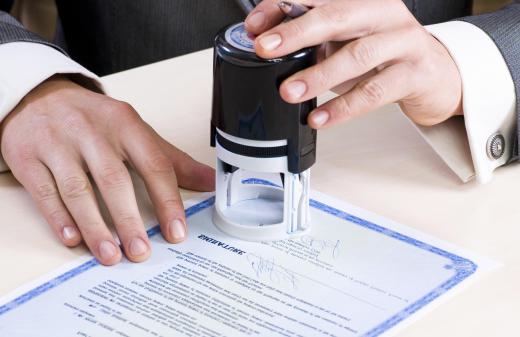At MyLawQuestions, we're committed to delivering accurate, trustworthy information. Our expert-authored content is rigorously fact-checked and sourced from credible authorities. Discover how we uphold the highest standards in providing you with reliable knowledge.
What Should be Included in a Finder's Fee Contract?
A finder's fee contract must be looked at in a contingency manner as all conditions, terms, and circumstances are different as far as each seller is concerned. A written and signed contract is essential if any sort of legal obligation to collect payment is expected by the finder. Agents or brokers who set interviews between buyers and sellers should always work with a contract that is brought forward at the beginning of the agent-seller meeting.
The agent's fee should always be included up front in the finder's fee contract, and the fee is usually expressed as a percentage of the sale price. Brokers and agents call the finder's fee a referral fee. Many times, the broker's request even for 1% of the sale price as a fee ends up being half that much. The end result depends on the negotiations made with the seller.

A finder's fee contract should not only state the percentage agreed on for the fee amount, but should specify when the agent or broker will have earned the fee, such as after a specific date or procedure. For example, if a broker introduces a prospective buyer to a seller's company and then that prospective buyer becomes the actual buyer, then the contract should state that transaction as warranting the finder's or referral fee.

Especially without a contract, casual "finders" may not receive any fee at all, depending on the personal and business relationships involved. The obligation felt by the seller usually determines whether a non-contracted finder's fee will be paid. The value of the introduction is a consideration when negotiating a finder's fee. A suggestion by the "finder" that the seller should call a certain prospective buyer is not usually considered worthy of a fee.
A finder's fee contract should be drafted by a lawyer and notarized whether the "finder" is a friend or family member or not. Always discuss the prospect of a finder's fee right from the beginning and never just assume there will be one. The contract should not only specify when, but how the payment for the fee will be made — for example by check, or direct deposit to the finder's account.
AS FEATURED ON:
AS FEATURED ON:












Discussion Comments
I am trying to find out what commissions are charged for agents who connect suppliers/manufacturers of goods with wholesalers/retailers?
For the benefit of readers, I want to add that finders fee does not have to be in writing if the relationship between the two parties establishes a history of paying finders fee by party of the other part to the finder. That history may be admissible as parole evidence to show that such a relationship in fact exists. Additionally, a finders fee can still be paid if, in the course of pursuing business with party A, the finder stumbles on an unrelated business lead that brought a contract with party B. Finders fee can also be called 'success fee', or 'facilitator's fee'.
Post your comments